| ɑː |
 |
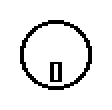 |
a, aa, ah |
Aal, Abend, Bahn |
long „a” as in „bar” – or „calm” |
Open your mouth wide, keep your tongue low and flat, and voice. |
| ʌ / a / æ |
 |
 |
a |
Salz, Wand, Mann |
short „u” as in Southern English „but” |
Keep your tongue in the center of your mouth, slightly raised, with your mouth open and lips relaxed while voicing. |
| ɛː |
 |
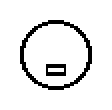 |
ä, äh |
Käse, spät, Nähmaschine, Fähre, Mähne |
long as in „air“ |
Raise the front of your tongue high in the mouth, spread your lips slightly, and voice. |
| ɛ / e |
 |
 |
e, ä |
essen, Bett, Eltern, Äste |
short „e” as in „bet” or „get“ |
Place your tongue mid-high in the mouth, open your mouth slightly, and voice. |
| b |
 |
 |
b, bb |
Boot, Ebbe, Banane, braun, aber |
as in English „bed” |
Press your lips together, build up pressure, then release while voicing. |
| ç |
 |
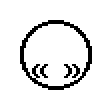 |
ch – nach e, i, ä, ö, ü, eu, äu, l,n,r, ei, „ig“ am Wortende |
ich, Teich, euch, Elch, Männchen, echt, nächste, möchte, Storch |
Imagine saying the English word „humor“ but breath with the tip of the tongue touching the back of the lower front teeth. |
Raise the middle of your tongue close to the hard palate, and push air through without vibrating the vocal cords. |
| x |
 |
 |
ch nach „a“, „o“, „u“ und „au“ |
acht, Tochter, Bauch, Buch, tauchen, Krach |
Imagine the rasping guttural sound made in the back of your throat before you spit. |
Raise the back of your tongue against the soft palate, and push air through without vibrating the vocal cords. |
| d |
 |
 |
d, dd |
Dose, Paddel, das, dumm |
same as its English equivalent „d” |
Place the tip of your tongue against the ridge behind your upper front teeth, build up pressure, then release while voicing. |
| d͡ʒ / ʤ |
 |
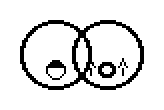 |
Dsch |
Dschungel |
judge |
Place the tip of your tongue against the ridge behind your upper front teeth, then release it while simultaneously voicing and passing air through a narrow gap. |
| eː |
 |
 |
e, ee, eh |
Esel, Schnee, Mehl |
long „e” similar to „a” in Northern English „gate” |
Raise the front of your tongue close to the roof of your mouth, keep your lips unrounded, and voice. |
| ə |
 |
 |
e |
Silbe, Hilfe, eine, kostet, Nadel, Nagel |
like the final syllable of the English word „brother” |
Keep your tongue in the middle of your mouth, mouth slightly open, and lips relaxed while voicing. |
| f |
 |
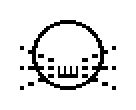 |
f, ff, v |
Fisch, Affe, fragen, Vater, voll, frisch |
as „f“ in „fun“ |
Press your bottom lip against your upper teeth, and push air through without vibrating the vocal cords. |
| ɡ |
 |
 |
g, gg |
gut, Gras, Gurke, Bagger |
like the „g“ in the English word „good“ or „go“ |
Raise the back of your tongue against the soft palate, build up pressure, then release while voicing. |
| ʒ |
 |
 |
g, j |
Garage, Jalousie |
like „sh“ but with voice |
Raise the front of your tongue close to the roof of your mouth, round your lips slightly, and voice. |
| h |
 |
 |
H, h |
Haus, Hund,hallo, heute |
house, he, hat |
Push air from your lungs through your open vocal tract without vibrating the vocal cords. |
| iː |
 |
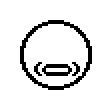 |
i, ie, ih, ieh |
Igel, Tier, ihm, Vieh |
long „ee” as in „bee” or „teeth” |
Raise the front of your tongue high and close to the roof of your mouth, keep your lips unrounded, and voice. |
| ɪ / i |
 |
 |
i |
ich, Milch, wichtig |
short „i“ as in „fit”; never as in „bite” |
Raise the front of your tongue high in the mouth, but not as high as for /iː/, keep your lips unrounded, and voice. |
| j |
 |
 |
j, y |
Junge, ja, Jo – Jo, Yacht |
like the „y“ in the English word „yes” |
Raise the middle of your tongue close to the roof of your mouth, keep your lips unrounded, and voice. |
| k |
 |
 |
k, ck, kk, c, ch, g |
Kind, Zucker, Mokka, Clown, Chaos, Flug, krank, dick, trinken |
like the „k“ in English |
Raise the back of your tongue against the soft palate, build up pressure, then release without voicing. |
| l |
 |
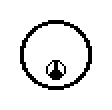 |
l, ll |
Lampe, Ball, lesen, leise, alt |
like „l” in „little” |
Place the tip of your tongue against the ridge behind your upper front teeth, and voice. |
| m |
 |
 |
m, mm |
Mutter, Maus, Hammer, Nummer, machen |
like „m“ as in English „mother“ |
Press your lips together, let the air pass through your nose, and voice. |
| n |
 |
 |
n, nn |
Name, Nase, Hand, Tante, rennen, Kanne, Susanne, nie |
like „n“ in „no“ or „name“ |
Place the tip of your tongue against the ridge behind your upper front teeth, let the air pass through your nose, and voice. |
| ŋ |
 |
 |
n, ng, nk |
Ring, Zange, Junge, Bon, krank, trinken |
like the „ng“ sound in the English word „song“ or „long” |
Raise the back of your tongue against the soft palate, let the air pass through your nose, and voice. |
| oː / o / ɑ |
 |
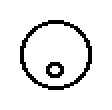 |
o, oo, oh |
Ofen, Oma, Kohle, Zoo, Krone, groß, Obst |
long „o” similar to „go” but with the lips more rounded and more open |
Raise the back of your tongue close to the roof of your mouth, round your lips, and voice. |
| ɔ |
 |
 |
o |
Onkel, offen, Kopf |
short „o” as in „stop” or „not” |
Lower the back of your tongue, open your mouth, and round your lips slightly while voicing. |
| øː |
 |
 |
ö, öh |
König, Löwe, blöd, Öl |
similar to „eu” in French „peu”; long, say a long e and purse your lips |
Raise the front of your tongue high in the mouth, round your lips tightly, and voice. |
| œ |
 |
 |
ö |
Öffnung, östlich |
short, cross between „i” in „dirt” and „eu” in French „peu” |
Raise the front of your tongue mid-high in the mouth, round your lips moderately, and voice. |
| ɔː |
 |
 |
|
|
call, four, saw |
Lower the back of your tongue, open your mouth wide, and round your lips while voicing. |
| p |
 |
 |
p (b - am Silbenende, oder vor s oder vor t ) |
Papa, Puppe, pusten, ab, Obst, Bobtail |
like „p“ in „Paula“ |
Press your lips together, build up pressure, then release without voicing. |
| p͡f |
 |
 |
pf |
Pfanne, Pfeffer, Pfau |
like „pf“ in „upfront“ |
Press your lips together, build up pressure, then release while simultaneously bringing your bottom lip close to your upper teeth, and push air through. |
| r |
 |
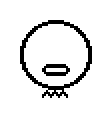 |
r, rr, rh |
Raupe, Karre, Rhabarber, rudern, rot |
„rrr” as if the speaker were gargling (there is another „r” produced with the tip of the tongue) |
Raise the back of your tongue close to the soft palate and make it vibrate while voicing. |
| ɹ |
 |
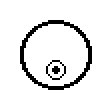 |
r |
run, red, car |
like the „r” in „run” or „red” |
Raise the tip of your tongue close to the ridge behind your upper front teeth without touching, keep your lips slightly rounded, and voice. |
| z |
 |
 |
s |
Saft, Rasen, Riese, Rose |
like an English „z” |
Place the tip of your tongue close to the ridge behind your upper front teeth, and push air through while voicing. |
| s |
 |
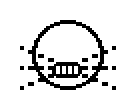 |
s, ss, ß, c |
Glas, Klasse, groß, City, Bus, muss, Wasser |
like an English „s” |
Place the tip of your tongue close to the ridge behind your upper front teeth, and push air through without voicing. |
| ʃ |
 |
 |
sch s(t), s(p), sh, ch |
Schule, Stein, Spinne, Shampoo, Chance |
like the „sh” at the beginning of „show” or „short” |
Raise the front of your tongue close to the roof of your mouth, round your lips, and push air through without voicing. |
| ð |
 |
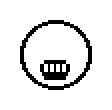 |
th |
the, mother, father, with |
like the „th” in „this” or „mother” |
Place the tip of your tongue between your upper and lower teeth, and push air through while voicing. |
| θ |
 |
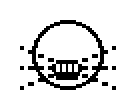 |
th |
three, youth, club, month |
like the „th” in „think” or „both” |
Place the tip of your tongue between your upper and lower teeth, and push air through without voicing. |
| t |
 |
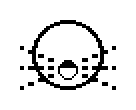 |
t, tt, th, dt, d |
Tasse, Ratte, Theater, Stadt, Wand, Hund, turnen, tot, traurig |
same as in English „Tom“ |
Place the tip of your tongue against the ridge behind your upper front teeth, build up pressure, then release without voicing. |
| tʃ / ʧ |
 |
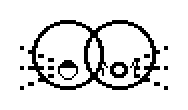 |
tsch, ch |
klatschen, Tschüs,knutschen |
like „ch” in „church” |
Place the tip of your tongue against the ridge behind your upper front teeth, then release it while simultaneously pushing air through a narrow gap. |
| uː / w |
 |
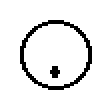 |
u, uh |
Buch, Tube, Huhn, Stuhl |
long „oo” as in „boot” with the lips much more rounded |
Raise the back of your tongue high in the mouth, round your lips tightly, and voice. |
| ʊ / u |
 |
 |
u |
Hund, Stunde, Unfall |
short „o“ like in „foot” or „push” |
Raise the back of your tongue high in the mouth, round your lips moderately, and voice. |
| yː |
 |
 |
ü, üh, y |
Gefühl, Kühltruhe, üben, Mühe, Mühle |
try to say a long German „ie“ sound and then purse your lips |
Raise the front of your tongue high in the mouth, round your lips tightly, and voice. |
| y |
 |
 |
ü |
Glück, zurück, Küste, dünn, Mücke |
short, like „u“ in French „une“ or English „dune“, but with lips pressed much closer together |
Raise the front of your tongue high in the mouth, round your lips tightly, and voice. |
| v |
 |
 |
w, v |
Wand, Wüste, wohnen, abwaschen, weit, Vase |
like „v“ in „very“, not English „w“ |
Press your bottom lip against your upper teeth, and push air through while voicing. |
| ks |
 |
 |
x, ks, gs, chs, cks |
Wachs, Taxi, Ochse, werktags, Luchs, Text, Knacks |
like the „x“ in the English word „oxen“ as a „ks” sound |
Make a /k/ sound followed immediately by an /s/ sound. |
| t͡s |
 |
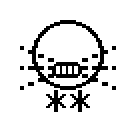 |
z, tz, zz, ts, ds |
Zahn, Katze, Pizza, Rätsel, Schiedsrichter |
like the „ts“ sound in the English words „lots” and „cats” (tsetse) |
Place the tip of your tongue against the ridge behind your upper front teeth, then release it while simultaneously pushing air through a narrow gap. |
| a͡ʊ |
 |
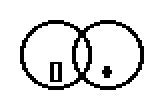 |
au, ao |
Auto, Stau, laut, Haus, Kakao |
„ow” as in English „cow” but in a more brief and clipped manner |
Start with your tongue low and your mouth open, then move your tongue upward and close your lips into a rounded shape while voicing. |
| ɔ͡ø |
 |
 |
äu, eu, oi |
Feuer, Eule, Gebäude, aufräumen, Konvoi |
„oy“ as in English „toy“ |
Start with your tongue low and your lips rounded, then move your tongue upward and forward while rounding your lips tighter. |
| a͡ɪ |
 |
 |
ei, ai, ay, ey, eih |
Hai, Eimer, leise, Meyer, Reihe, Karl May |
English „i“ as in „high“ or „mine” |
Start with your tongue low and your mouth open, then move your tongue upward and close your lips into a slight smile while voicing. |
















































